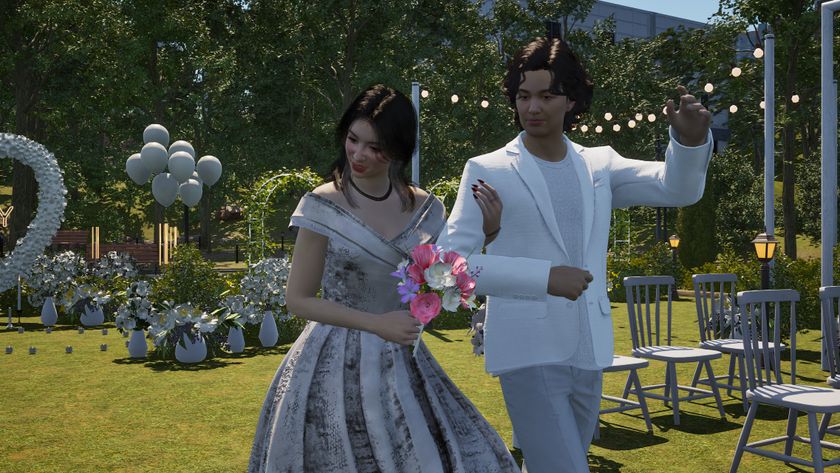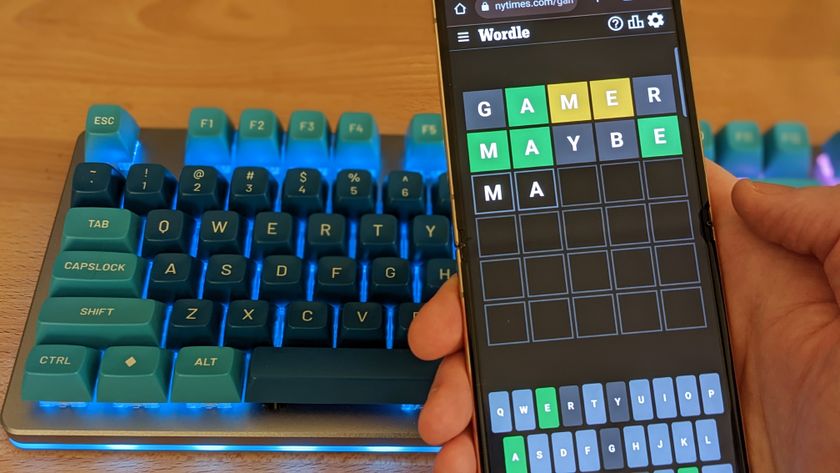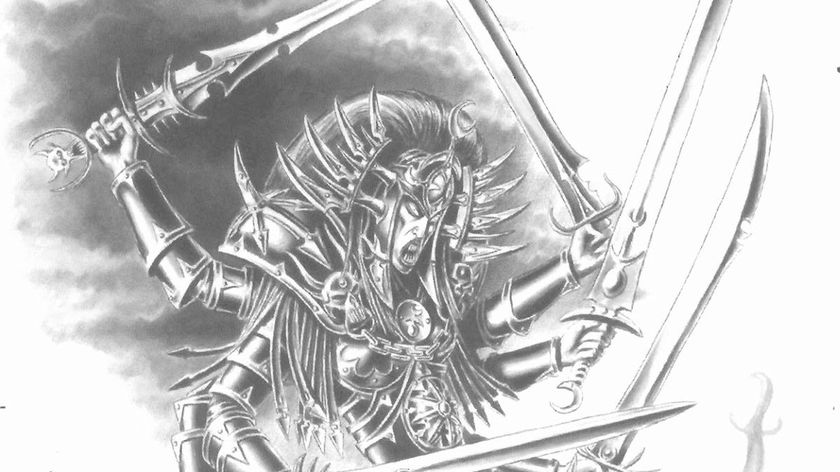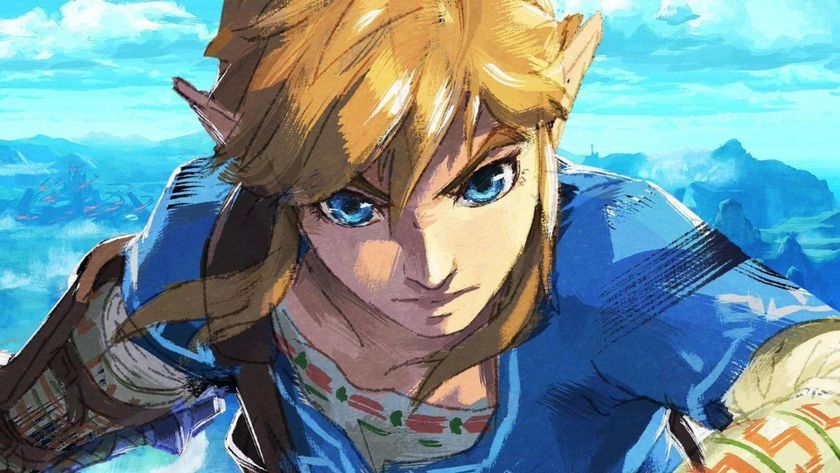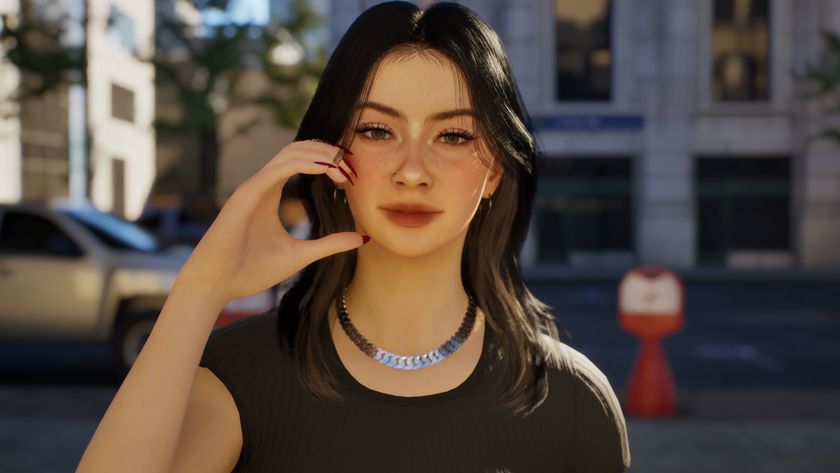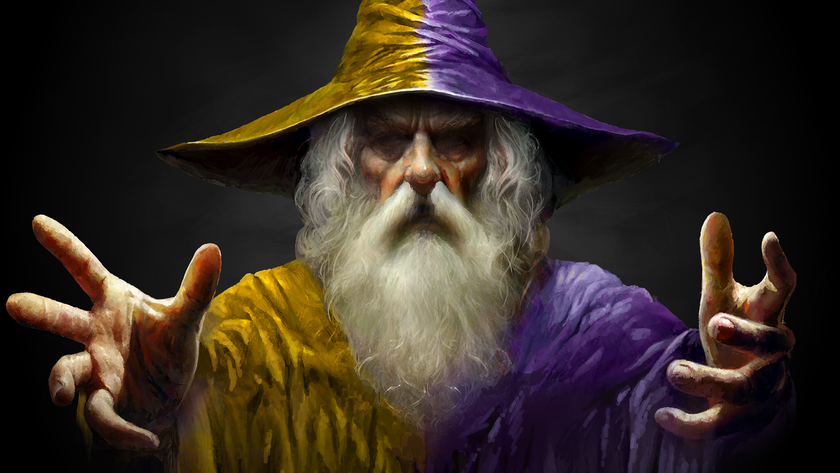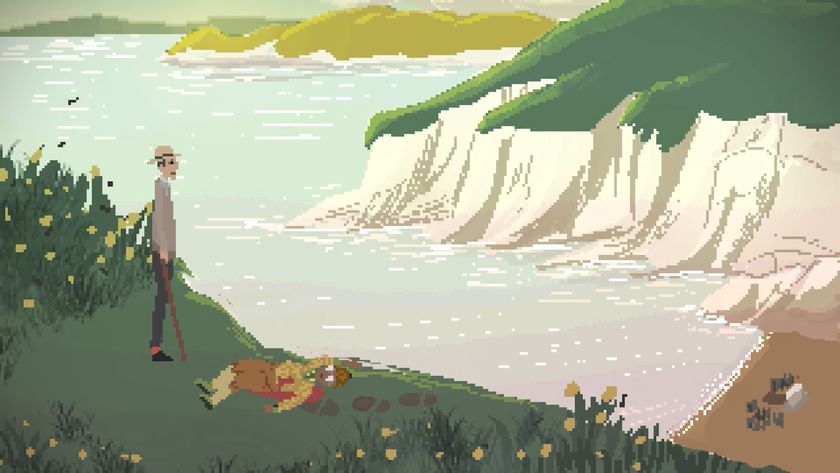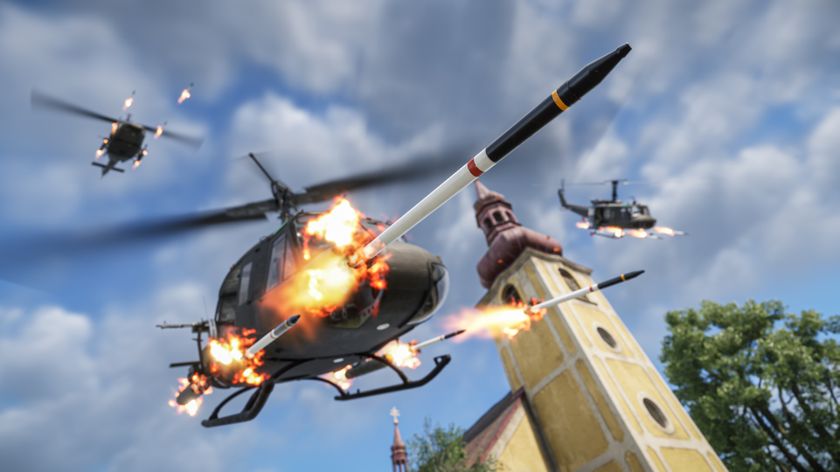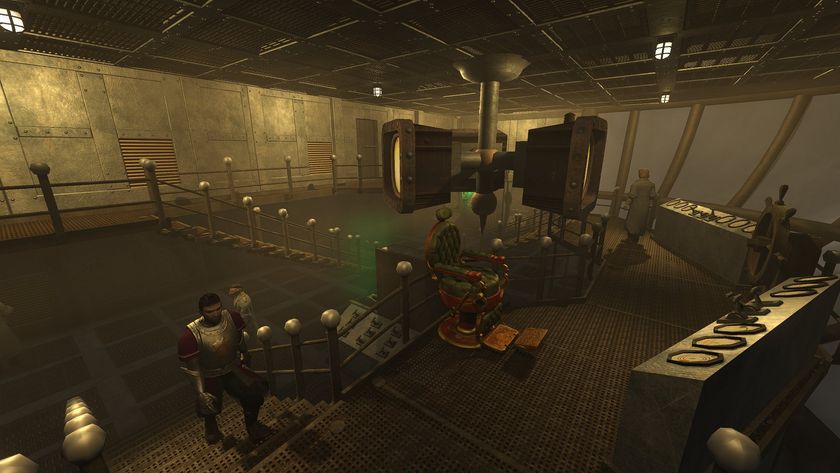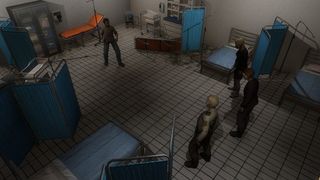
DoubleBear Productions is less than $20,000 away from unleashing the zombie apocalypse. Their turn-based survival RPG Dead State is well on-track to meet its Kickstarter funding goal, with over $130,000 of $150,000 already raised and only half of the time limit for fund-raising elapsed. We had a chat with lead designer and Black Isle/Troika/Obsidian veteran Brian Mitsoda about crowd-funding the end of the world, why he thinks that explaining the undead's origin is lame, and how Dead State isn't "just another zombie game."
PC Gamer: Your Kickstarter campaign has been very successful. How does the reality compare to what you expected at the start?
Brian Mitsoda: We're kind of following the normal Kickstarter trend right now. We started really big and that was really very exciting. It's been kind of dropping off in the middle, which it generally does. The expectations are that we're pretty sure we're going to get funded. Our biggest goal right now is to hit the 150 mark which, if you've watched any of the other Kickstarters, a lot of times that's when a bunch of other people will be like, "Oh, it's funded. Let's go fund that now." And then, of course, you've got a huge push at the end generally.
Really, the hardest part for us has been that there's been a bit of Kickstarter fatigue in the press lately. For a lot of press, they're like, "Oh, yeah, Kickstarter. That was really big... back in April."
The other thing that's kind of worked against us is that we have zombies in our game. And I don't know if you're aware, but there are a lot of games that use zombies. And so we've kind of tried to deal with this problem of, "Oh, look, another zombie game!" And one of the things we've tried to get across to people and the press is that the zombies really are not the major focus of the game. It's really just an excuse to have an interesting combat mechanic and explain why the whole world has fallen apart: "Well, the zombies have kind of pushed it in that direction, but let's focus on the humans."
PCG: What would you say is the most unexpected or surprising part of this process so far?
BM: When we were getting things together for the Kickstarter build, it was a pretty insane push and we were working pretty late hours because we wanted to show as much as possible. Getting together videos and stuff like that. And we thought, "Oh, it'll all be over soon! And we'll get the Kickstarter out!" But it's been pretty long hours ever since the Kickstarter launched as well, trying to get press awareness, working on the game as well, and answering e-mails from people, and answering stuff on our forums... You just get a ton of contact from all kinds of people.
The biggest gaming news, reviews and hardware deals
Keep up to date with the most important stories and the best deals, as picked by the PC Gamer team.
Many, many e-mails from composers--and by the way, we do have a composer, everybody. And it's pretty much become a full-time thing where my wife and I have been doing nonstop e-mails with press and other people. It's been a lot of work.
PCG: How does this model compare to working on a game for a major publisher?
BM: Well, for a major publisher, you're going to have times when you're really busy, but you're pretty much dedicated to your section of the game. Unless you're the project lead, and then you're probably in meetings all day. But for indie games, we have a very small team. So, many times, for things not to fall through the cracks, somebody has to take responsibility for them. And a lot of times that person is me.
When you go indie, be prepared to wear a lot of hats. You're going to be the project lead, you're going to be the lead designer, you're going to be the writer, you're going to be the scripter on this level, you're going be the producer, you're going to be the press person, you're going to be the community manager... you're going to be doing a lot of that. So be very good at budgeting your time.

PCG: How many people do you have working full-time on the game right now?
BM: Right now, it's just me, my lead artist Oscar, lead programmer Nick, and then our lead animator. Those are the only people working full-time. We have a lot of contributors and other team memebers that are working on it pretty much every day, part-time. And we're hoping to get most of those guys up to full-time after we've got the Kickstarter done.
PCG: You've talked about Dead State being a very open-ended game. Is there an endgame? Or do you just keep playing forever or until you die?
BM: We definitely didn't want to do something where you just continually play, because we have a lot of story/narrative progression. And a very open narrative, not like a heavy-handed, linear narrative. A lot of stuff opens up as you play. We do have multiple endings. There are a lot of different ways that you can end the game, and some of those are failure states. We do have ways that you can end the game prematurely just because you played so poorly. Which I find refreshing, because you don't see that anymore. But we're not going to punish the player too much. I really don't want to get people into the, "Oh, hey, you messed up once: You're dead!" kind of situation.
Depending on who you meet, depending on your relationship with other groups, depending on where you go and at what time--we open up a lot of possibilities as the game goes on. There will definitely be ways to get a little bit more of a heroic ending or a selfish ending. There are going to be a lot of options. It really depends on how you play. I know there are always going to be people who are like, "Well, I killed off all of the allies at the shelter. I win!" But really, our focus has been having every player have their own narrative of what they did at their shelter. What is their story?
PCG: Can all of your allies die? What happens if, say, all of your co-leaders are dead and it's just you?
BM: Assuming you didn't piss people off enough to get ejected from the shelter yourself, you can still play it. I assume it would be a very different experience. I haven't personally tried that path. I'm sure I'm going to assign somebody to do that. But what we want to emphasize in the game is, you kind of need other people to get by. I'm guessing that at a certain point, it's going to be a little bit too difficult to just be on your own. Although that sounds like an "Iron Man" mode waiting for someone to make it themselves, and go, "I got through by myself! I'm the best!" The first person that does that in the game, I want to hear how they did it.
PCG: How long do you intend a typical game of Dead State to last, assuming it doesn't end early with everyone dying horribly.
BM: Right now our estimate is about 50+ hours, at least. And there are so many optional things you can do in the game that can be padded out. It really depends on how many people you have [at your shelter], what your interactions are, how often you like to get into combat. We don't encourage people to get into combat for experience, so some people are probably going to try to be a little more quiet. There are definitely ways to work things out in dialogue. I'd wager on your first playthrough it's going to be a little bit longer.
PCG: Are the NPC co-leaders the same every time you play?
BM: Right now, yeah. There are dozens of allies, but as far as co-leaders go, they are all the same for every playthrough assuming you get them. But there are different ways that you can approach them. Basically, with any ally, the way that you interact with them can change their personality a lot. That also depends on your skills and who else you have in the shelter.
I don't think everyone's going to get all the allies every time. You're not going to find them all your first time through. As far as the co-leaders go, the reason they're always the same is because the crisis events they participate in are an awful lot of dialogue and script checks. And if we had it so that you could pick anybody [as a co-leader], we would have to write dozens of people into each crisis event, which would be a phenomenal amount of work. But we do plan on doing post-release for Dead State, and one of the things we'd like to do is add more characters and more options.
PCG: You mentioned post-release content. What are your plans for that?
BM: We definitely want to add options for things that the community really wants. For example, modifiers for new games. So, antibiotics is one of those things we might make a modifier for. So if you don't want to play the hardcore mode, you just want to turn off antibiotics in the normal mode. Or things like how much food you need per day.
One thing we've been talking about is, so many people have wanted full control of their party. And that's something we won't be doing for the normal game. But if there's enough demand for that post-release, we might do something like, "This isn't really how the game is supposed to be played, but if you really want this, we've added this modifier." We're looking at new allies, new content. And of course we'd like to work on some full-fledged expansions as well.
PCG: How do you plan to fund and price post-release content?
BM: For any of the post-release stuff, we won't be doing Kickstarter. We don't really want to nickel and dime people with DLC. We're not big fans of that, and we don't really like having everybody play different games with different items that are probably breaking the game in horrible ways. So what we'd like to do is put out content that is for everybody that has the core game [free.] And if we do have an expansion that's stand-alone, that would cost $5-10. Which would be a significant new game with 20 or 30 hours or something. Rather than something where you paid five bucks for two more hours of content.
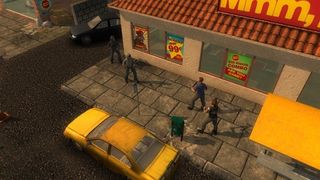
PCG: In terms of story, are you going with a more unknowable apocalypse? Or will it be possible through gameplay to discover what happened, where all the zombies came from, etc.?
BM: I'm a big believer in the unknowable. Because it's always hokey, right? Whenever they try to explain where the zombies came from, or where vampires came from, or whatever. It always ends up being something really ludicrous. And how many people would even know [in the game world] about what's really going on? It's one of those things where we throw out a lot of theories. Everybody seems to have their own theory, and everybody has kind of heard something. But communication has broken down, and now it's like a game of telephone where everybody has heard something , but you never really know.
PCG: Do you plan to make the game moddable?
BM: Dedicated modding tools tend to be something that you almost need a separate team to develop. It's not even our own engine, we're licensing it, so I'm not even sure what our ability to put out mod tools are. We know there are a lot of modders that will come up with something anyhow. And we'll keep an eye on that. And if people have come up with something better than we could have done ourselves, we'll probably just ask if we can use that. But as far as modding out of the box, that's kind of out of our scope right now. It's also something that we could do post-release, but we'll have to see just how many people it's going to take.
Thanks to Brian for taking the time to talk to us! You still have a couple weeks to fund Dead State if you haven't already.
Len Hafer is a freelancer and lifelong PC gamer with a specialty in strategy, RPGs, horror, and survival games. A chance encounter with Warcraft 2: Tides of Darkness changed her life forever. Today, her favorites include the grand strategy games from Paradox Interactive like Crusader Kings and Europa Universalis, and thought-provoking, story-rich RPGs like Persona 5 and Disco Elysium. She also loves history, hiking in the mountains of Colorado, and heavy metal music.
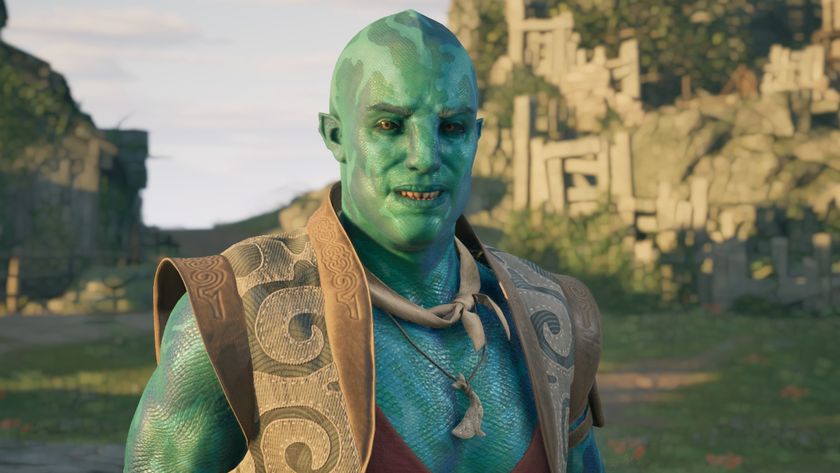
Obsidian snuck goodies and secrets around every corner to make exploring Avowed feel worthwhile: 'If you have a lot of dead ends that lead nowhere, you learn the lesson as a player: This game doesn't have much to offer me'
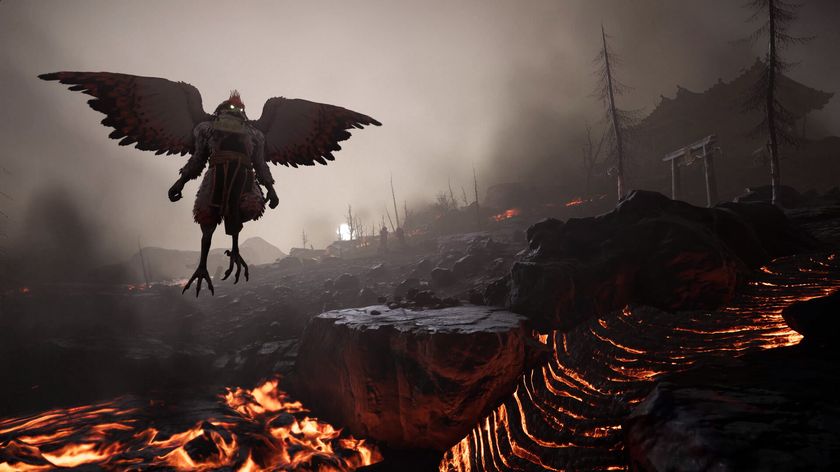
Tactical RPG Shadow Of The Road's open Alpha test lets players get a free first taste of its samurai versus steampunk setting
